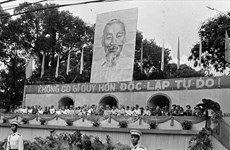APEC ministers seek to broaden free trade area
Ministers of the Asia-Pacific Economic Cooperation (APEC) forum have
affirmed the need to take “concrete steps” toward the goal of creating a
region-wide free trade area, and to resist protectionism.
Ministers of the Asia-Pacific Economic Cooperation (APEC) forum have
affirmed the need to take “concrete steps” toward the goal of creating a
region-wide free trade area, and to resist protectionism.
In a joint statement issued at the end of a two-day meeting in Yokohama, Japan, on Nov. 11, trade and foreign ministers of the 21 APEC economies emphasised that taking concrete steps toward the realisation of a Free Trade Area of the Asia-Pacific ( FTAAP) is an important part of the regional economic integration (REI) agenda.
At the meeting, the ministers had an intensive discussion on the economies’ progress toward achieving the Bogor Goals of free and open trade and investment, and agreed to work together to speed up the Doha round of talks on global trade liberalisation.
The ministers recommended the APEC leaders continue to extend the 2008 commitments to not increasing barriers to the flows of goods and services as well as investment barriers, and not imposing new measures to control exports or performing measures that go counter to regulations of the World Trade Organisation (WTO) in all fields until 2013.
They reaffirmed the importance of continuing to implement the existing principles and endorsed the formulation of the APEC Strategy for Investment, which consists of three pillars: advanced principles and practices; facilitation; and promotion.
The ministers also recognised the importance of enhancing communication between the private sector and policymakers, and agreed to hold the APEC Public-Private Dialogue on Investment.
Having assessed APEC as the world’s leading growth centre after the global financial crisis, the ministers warned that the crisis has yet to end absolutely and global economic recovery remains weak, while APEC is facing a range of challenges in creating jobs and strengthening its financial platform.
In this context, APEC has the role to share a growth strategy to sustain recovery and to lay the foundation for global future prosperity. The ministers agreed to work together with other relevant international forums, including the G20 and the Association of Southeast Asian Nations (ASEAN).
The outcomes reached at the 22nd APEC Ministerial Meeting of foreign and economic/trade ministers will be submitted to the APEC summit scheduled to take place on Nov. 13-14.
Statistics released by the Japanese Government show APEC currently accounts for 52.7 percent of the world’s GDP and 44.4 percent of global trade value.
Vietnam’s Deputy Prime Minister cum Foreign Minister Pham Gia Khiem and Minister of Industry and Trade Vu Huy Hoang attended the meeting.
Addressing the event, Vietnam’s Deputy Prime Minister cum Foreign Minister Pham Gia Khiem hailed APEC’s recent growth achievements and the integration of regional economies, saying these have created a facelift for the business environment in Asia-Pacific.
He noted that in the post-crisis era, APEC’s formulation of a new growth strategy was a significant development move.
The Deputy PM underscored the need for the forum to increase the supply of resources as well as coordination with existing regional mechanisms, especially ASEAN and ASEAN+, to effectively carry out this strategy and other cooperative programmes to bring APEC into a new period of growth.
On the sidelines of the event, Deputy PM Khiem and Minister of Industry and Trade Vu Huy Hoang held bilateral meetings with the delegation heads of APEC member economies, including Japan, the US, Canada, Australia, New Zealand, and Mexico.
They discussed measures to boost bilateral ties along with international and regional issues of common concern and coordination at multilateral forums.
The delegation heads spoke highly of Vietnam’s successes in maintaining its growth rate and its growing international position and viewed the country’s successful role as ASEAN Chair in 2010 as contributing to enhancing ASEAN’s role in the region’s new structure and in APEC in particular.
At his meeting with Japanese Foreign Minister Seiji Maehara, Deputy PM and FM Pham Gia Khiem gave a high evaluation of Japan’s successful organisation of the 22 nd APEC Trade and Foreign Ministers Meeting and expressed his belief that the country’s careful preparation for the 18 th APEC Summit would help steer APEC cooperation along a new direction of greater practicality and efficiency.
The two FMs showed their determination to bolster the two countries’ specific cooperative measures that have recently been adopted by their leaders, especially those agreed in Japanese Prime Minister Naoto Kan’s Vietnam visit./.
In a joint statement issued at the end of a two-day meeting in Yokohama, Japan, on Nov. 11, trade and foreign ministers of the 21 APEC economies emphasised that taking concrete steps toward the realisation of a Free Trade Area of the Asia-Pacific ( FTAAP) is an important part of the regional economic integration (REI) agenda.
At the meeting, the ministers had an intensive discussion on the economies’ progress toward achieving the Bogor Goals of free and open trade and investment, and agreed to work together to speed up the Doha round of talks on global trade liberalisation.
The ministers recommended the APEC leaders continue to extend the 2008 commitments to not increasing barriers to the flows of goods and services as well as investment barriers, and not imposing new measures to control exports or performing measures that go counter to regulations of the World Trade Organisation (WTO) in all fields until 2013.
They reaffirmed the importance of continuing to implement the existing principles and endorsed the formulation of the APEC Strategy for Investment, which consists of three pillars: advanced principles and practices; facilitation; and promotion.
The ministers also recognised the importance of enhancing communication between the private sector and policymakers, and agreed to hold the APEC Public-Private Dialogue on Investment.
Having assessed APEC as the world’s leading growth centre after the global financial crisis, the ministers warned that the crisis has yet to end absolutely and global economic recovery remains weak, while APEC is facing a range of challenges in creating jobs and strengthening its financial platform.
In this context, APEC has the role to share a growth strategy to sustain recovery and to lay the foundation for global future prosperity. The ministers agreed to work together with other relevant international forums, including the G20 and the Association of Southeast Asian Nations (ASEAN).
The outcomes reached at the 22nd APEC Ministerial Meeting of foreign and economic/trade ministers will be submitted to the APEC summit scheduled to take place on Nov. 13-14.
Statistics released by the Japanese Government show APEC currently accounts for 52.7 percent of the world’s GDP and 44.4 percent of global trade value.
Vietnam’s Deputy Prime Minister cum Foreign Minister Pham Gia Khiem and Minister of Industry and Trade Vu Huy Hoang attended the meeting.
Addressing the event, Vietnam’s Deputy Prime Minister cum Foreign Minister Pham Gia Khiem hailed APEC’s recent growth achievements and the integration of regional economies, saying these have created a facelift for the business environment in Asia-Pacific.
He noted that in the post-crisis era, APEC’s formulation of a new growth strategy was a significant development move.
The Deputy PM underscored the need for the forum to increase the supply of resources as well as coordination with existing regional mechanisms, especially ASEAN and ASEAN+, to effectively carry out this strategy and other cooperative programmes to bring APEC into a new period of growth.
On the sidelines of the event, Deputy PM Khiem and Minister of Industry and Trade Vu Huy Hoang held bilateral meetings with the delegation heads of APEC member economies, including Japan, the US, Canada, Australia, New Zealand, and Mexico.
They discussed measures to boost bilateral ties along with international and regional issues of common concern and coordination at multilateral forums.
The delegation heads spoke highly of Vietnam’s successes in maintaining its growth rate and its growing international position and viewed the country’s successful role as ASEAN Chair in 2010 as contributing to enhancing ASEAN’s role in the region’s new structure and in APEC in particular.
At his meeting with Japanese Foreign Minister Seiji Maehara, Deputy PM and FM Pham Gia Khiem gave a high evaluation of Japan’s successful organisation of the 22 nd APEC Trade and Foreign Ministers Meeting and expressed his belief that the country’s careful preparation for the 18 th APEC Summit would help steer APEC cooperation along a new direction of greater practicality and efficiency.
The two FMs showed their determination to bolster the two countries’ specific cooperative measures that have recently been adopted by their leaders, especially those agreed in Japanese Prime Minister Naoto Kan’s Vietnam visit./.











